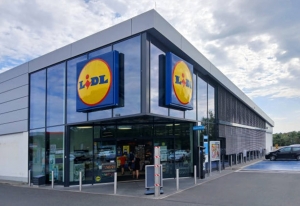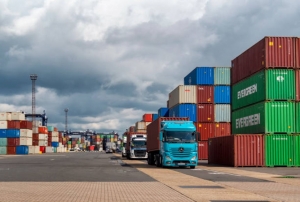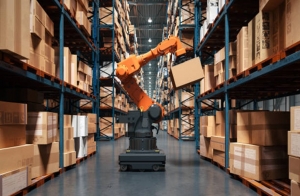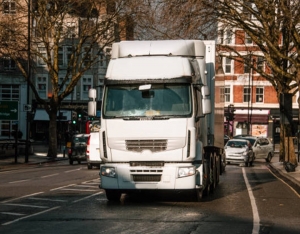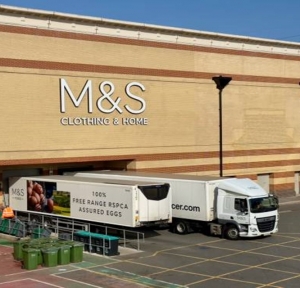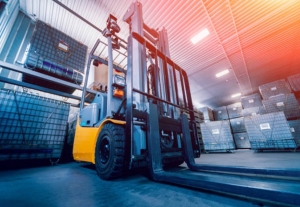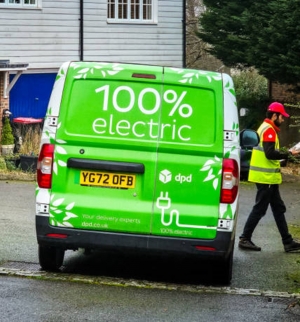Lidl Opens Europe’s Largest Logistics Hub Near Paris
Lidl has unveiled its new flagship logistics hub in Ablis, located southwest of Paris. Spanning an impressive 87,000 square metres, the facility is now the largest of its kind in Europe and marks a significant milestone in the supermarket chain’s expansion strategy. The hub, which took over seven years to complete, will initially support around fifty Lidl stores across the Paris region.
The state-of-the-art distribution centre is designed with future growth in mind, as Lidl continues to expand its presence in France. Featuring 5,800 square metres of office space and fourteen loading docks, the hub can manage 9,000 incoming pallets daily, with 10,000 dispatched each week. By March, all fifteen storage and processing zones within the facility are expected to be fully operational, ensuring it is ready to meet increasing demand as Lidl opens more stores.
Sustainability is at the heart of the new hub, which recycles 92% of its waste and incorporates innovative logistics to maximise efficiency. Trucks leaving the site carry not only goods but also waste, reducing the need for empty return trips. Additionally, over 12,000 square metres of solar panels have been installed, providing a quarter of the building’s energy requirements.
The launch of this facility signals Lidl’s commitment to both growth and environmental responsibility, setting a benchmark for logistics in the retail sector.
Driver Shortages Pose Ongoing Challenges for UK Transport Sector
The UK transport and logistics industry continues to grapple with significant challenges as driver shortages strain operations nationwide. Despite efforts by the government and stakeholders to address the issue, systemic problems such as low pay, poor working conditions, and an ageing workforce persist. These issues, compounded by the aftermath of Brexit and the COVID-19 pandemic, threaten the efficiency and profitability of fleet operations across the country.
While the term "shortage" is often debated, many industry experts argue that recruitment and retention difficulties stem from unsatisfactory conditions rather than a lack of qualified drivers. Factors such as reliance on overseas labour, delays in HGV driver testing during the pandemic, and the profession’s reputation for gruelling hours and inadequate roadside facilities have deterred new entrants. Government plans to invest £100 million in improving driver facilities, including secure parking and better amenities, are in progress but have yet to make a tangible impact.
The shortage has had widespread effects on fleet managers, with increased costs, reduced reliability, and greater pressure on existing drivers. Rising insurance premiums, exacerbated by a lack of experienced drivers, add to the burden. Businesses relying on timely logistics also face disruptions, with late deliveries leading to dissatisfied customers and long-term reputational risks.
To build resilience in the sector, collaborative efforts are essential. Improving driver welfare, adopting advanced technologies, and fostering partnerships with insurers, training providers, and local councils are crucial steps. By addressing these challenges head-on, the UK transport sector can work towards a sustainable and efficient future.
ST Logistics and Lenovo Partner to Revolutionise Warehouse Operations
Singapore-based ST Logistics has partnered with Lenovo to introduce advanced automation technologies into its warehouses, leveraging a new warehouse execution system and artificial intelligence (AI) algorithms. The system streamlines the flow of goods within warehouses, automatically identifying the quickest and safest routes for item transportation to enhance order fulfilment efficiency.
Lenovo’s high-performance computing solutions, including its ThinkSystem servers, underpin the AI-powered algorithms, enabling the optimisation of storage and prioritisation of items ready for immediate dispatch. This ensures faster access to high-priority goods, improving overall warehouse productivity. Lance Ong, deputy general manager for homeland security operations at ST Logistics, praised Lenovo’s role in delivering a comprehensive solution, stating: “Their support and ecosystem drove tangible outcomes, and we know we can always count on them.”
The collaboration also focuses on workforce development, equipping employees with the skills to manage and operate the automated systems. This highlights the continued importance of human expertise alongside technological advancements, ensuring seamless integration of automation within the workforce.
This initiative aligns with the Singapore Economy 2030 vision, which emphasises innovation in trade, enterprise, and manufacturing. By creating a more efficient and sustainable supply chain, the partnership aims to strengthen Singapore’s regional competitiveness. Lenovo Singapore’s general manager, Nigel Lee, described the collaboration as a transformative step towards intelligent and sustainable supply chains, reflecting the company’s commitment to driving innovation in the logistics sector.
Call for Action to Prevent HGVs Using Town Roads as Shortcuts
Efforts are underway to discourage lorry and HGV drivers from using roads in Caversham and Reading as shortcuts to access the M4, amid rising concerns over road safety. Recent incidents, including lorries getting stuck under bridges and collisions with structures, have highlighted the risks posed by heavy vehicles in the area.
Calls have been made to encourage drivers coming from Oxfordshire to use alternative routes, such as the A34 leading to Junction 13 at Chieveley, instead of cutting through Reading. Notable accidents last year included lorries becoming wedged under the Caversham Road railway bridge and another colliding with a university building on Redlands Road.
Reading MP Matt Rodda raised the issue in a parliamentary debate on road safety, urging for better cooperation between Oxfordshire County Council and Reading Borough Council to address the problem. He criticised the lack of joint action, describing the current situation as “unacceptable,” and called for a preventative approach to road safety to reduce unnecessary injuries and fatalities.
Reading Borough Council is exploring measures to tackle through-traffic, including potential charges for vehicles, such as HGVs, that pass through the town without a destination there. Councillor John Ennis, responsible for climate strategy and transport, highlighted how through-traffic contributes to congestion and poor air quality, issues he said must be addressed urgently.
M&S Bolsters Fleet with Zero and Low Emission Vehicles
Marks & Spencer has announced the addition of 85 zero or low-emission vehicles to its logistics fleet as part of its Plan A commitment to achieve Net Zero by 2040. This investment aligns with the retailer’s goals to transition to low-carbon logistics and adopt cleaner fuels and advanced technologies. Among the new vehicles are five fully electric HGVs that will operate between the Welham Green distribution centre and 30 stores across London and the South East, replacing equivalent diesel trucks.
The battery-electric HGVs are part of the UK Government's eFREIGHT 2030 initiative, designed to decarbonise road freight by promoting the use of zero-emission heavy goods vehicles and supporting infrastructure. As a founding member of the programme, M&S will gain valuable data on the performance of electric HGVs to guide future fleet decisions, while continuing to introduce cleaner fuels and lower-emission alternatives.
In addition to electric vehicles, M&S has introduced compressed natural gas (CNG) lorries to its Clothing & Home and Food logistics operations. This includes the UK’s first 6×2 CNG trucks and 50 4×2 CNG vehicles powered by biomethane, a renewable fuel that reduces CO2 emissions by up to 85% compared to diesel engines. Once operational, these 85 vehicles will account for nearly 10% of M&S’s transport fleet.
M&S remains committed to reducing its carbon footprint through innovation and collaboration. Julian Bailey, Head of Group Transport, emphasised that adapting logistics operations is key to meeting sustainability goals while ensuring efficient delivery of products. Future of Roads Minister Lilian Greenwood praised M&S’s efforts, highlighting the government’s substantial investment in zero-emission technologies to support the transition to a greener future.
DB Schenker Introduces Remote-Controlled Forklifts in Logistics Operations
DB Schenker has unveiled remote-controlled forklifts at its contract logistics site in Kassel, Germany, marking a significant milestone in the company’s automation journey. Developed in collaboration with German start-up enabl Technologies, the forklifts are operated remotely by drivers via a cutting-edge platform, allowing for control of multiple vehicles across various locations. This innovation aims to enhance flexibility and boost operational efficiency.
As part of its broader digitalisation strategy, DB Schenker is leveraging automation to improve productivity and tackle challenges such as labour shortages and fluctuating demand. The partnership with enabl Technologies is a crucial step in modernising its logistics operations. A recently signed letter of intent between the two companies outlines plans to roll out the remote-controlled forklifts at international locations, cementing their commitment to advancing warehouse technology.
The introduction of this technology reflects DB Schenker’s dedication to staying ahead in the evolving logistics landscape. By integrating remote-controlled forklifts, the company continues to position itself as a leader in digital innovation within the sector. These forklifts eliminate the need for on-site drivers, demonstrating the effectiveness and safety of enabl’s solutions.
DB Schenker’s Vice President of Global Engineering and Innovation, Lucas Mömken, emphasised that the collaboration with enabl enhances process automation and ensures competitiveness. Enabl Technologies CEO Julian Wadephul highlighted the system’s proven reliability and its role in setting new standards for warehouse automation globally.
UK Enforces Sustainable Aviation Fuel Mandate
The UK has become the first country to enshrine a Sustainable Aviation Fuel (SAF) Mandate into law, aiming for 10% of all jet fuel to be sustainable by 2030. Announced on 1st January, the mandate requires at least 2% of jet fuel for UK departures to be sustainable by 2025, with SAF derived from sources like cooking oil and household waste. The move is part of the government’s green aviation strategy to reduce emissions.
Plans include producing 1.2 million tonnes of SAF annually by 2030, enough to fuel 3,000 flights around the globe. Aviation Minister Mike Kane described the mandate as a significant step towards making aviation greener and more sustainable. He highlighted the industry’s growing popularity and its potential to create thousands of jobs within the UK’s SAF sector.
The Jet Zero Task Force, which first met in December, will guide the mandate’s implementation and explore pathways to cleaner aviation. A revenue scheme has also been introduced to attract investment in SAF plants across the UK, ensuring the industry’s growth and innovation.
Industry leaders welcomed the mandate but emphasised the need for expanded feedstock options and cost-reduction measures. Tim Alderslade, CEO of Airlines UK, stressed that clear revenue mechanisms are essential to scale up SAF production while keeping costs manageable for airlines and consumers.
Challenges Hamper Electric Van Transition for Fleet Operators
Fleet operators are struggling with the shift to electric vans due to high upfront costs and insufficient charging infrastructure, according to a Department for Energy Security and Net Zero report conducted by TRL. Despite policies phasing out internal combustion engine vehicles by 2030, the move to electrify commercial vans is progressing slower than expected.
The report, EV Adoption and Smart Charging for Electric Vans and Commercial Fleets, highlights operational issues. Fleet operators rely on overnight depot or home charging due to limited public infrastructure, long wait times, and inconsistent availability. Electric vans are mainly used for shorter routes, with operators cautious about range limitations, particularly for heavily loaded vehicles, as real-world performance often falls short of advertised ranges.
Smaller fleets face significant financial barriers, with the cost of installing depot chargers and upgrading power supplies proving prohibitive. Driver reluctance adds to the challenge, with concerns over range anxiety, logistical difficulties with home charging, and a lack of financial incentives slowing adoption. Inconsistent public charging further complicates mid-shift charging for many fleets.
The report calls for expanded grants for depot infrastructure upgrades, incentives for shared charging facilities, and dedicated public charge points for commercial vehicles. It also suggests providing better real-world range data, simplifying smart charging adoption, and fostering collaboration within the industry to share solutions and best practices.


